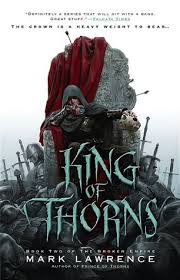
2‑King of Thorns
Chapter 46: Wedding day
by Mark, Lawrence,The chapter “Wedding Day” from *King of Thorns: Book Two of the Broken Empire* marks a pivotal moment in the narrative, blending political intrigue with personal stakes. The protagonist, Jorg Ancrath, navigates the complexities of his arranged marriage, a union fraught with tension and strategic implications. The ceremony is not merely a personal milestone but a calculated move in the broader power struggles of the Broken Empire. Jorg’s internal monologue reveals his ambivalence, as he balances his ruthless ambitions with the unexpected emotions stirred by the occasion.
The wedding serves as a microcosm of the empire’s fractured alliances and shifting loyalties. Various factions attend, each with their own agendas, turning the event into a high-stakes political theater. Jorg’s interactions with guests highlight the precarious nature of his rule, as threats lurk beneath the veneer of celebration. The chapter underscores the duality of Jorg’s character—his capacity for both cold calculation and fleeting vulnerability. The tension between his public persona and private reflections adds depth to the narrative.
Amid the pomp and ceremony, the chapter foreshadows impending conflict. The wedding’s festivities are punctuated by subtle warnings and veiled threats, suggesting that the fragile peace will not last. Jorg’s sharp observations and strategic mind are on full display as he anticipates potential betrayals. The juxtaposition of joy and danger creates a sense of unease, reinforcing the novel’s dark and unpredictable tone. The chapter masterfully builds suspense, leaving readers wary of what lies ahead.
Ultimately, “Wedding Day” is a turning point that encapsulates the themes of power, loyalty, and identity central to the series. Jorg’s marriage symbolizes both an alliance and a potential weakness, as personal ties complicate his ruthless pursuit of dominance. The chapter’s rich imagery and layered dialogue deepen the reader’s understanding of the Broken Empire’s brutal world. By the end, it is clear that the wedding is not an end but a beginning, setting the stage for the next phase of Jorg’s tumultuous journey.
FAQs
1. What is the significance of the chapter title “45: Wedding Day” in King of Thorns: Book Two of the Broken Empire?
Answer:
The chapter title “45: Wedding Day” likely marks a pivotal moment in the narrative, symbolizing a major event in the protagonist’s journey—possibly a political or strategic marriage that could alter power dynamics in the Broken Empire. While the provided content is minimal, wedding days in fantasy literature often serve as turning points, blending personal and political stakes. In King of Thorns, such an event might reflect Jorg Ancrath’s calculated maneuvers or the consequences of his ruthless ambition, tying into broader themes of power, loyalty, and sacrifice.2. How might Jorg Ancrath’s approach to marriage differ from traditional royal weddings in fantasy literature?
Answer:
Given Jorg’s morally ambiguous and pragmatic nature, his “wedding day” is unlikely to follow conventional romantic or ceremonial tropes. Instead, it may be a strategic tool for consolidation of power, manipulation, or even betrayal. Unlike traditional fantasy weddings that emphasize alliances or love, Jorg’s version could involve coercion, hidden agendas, or violence—reflecting his worldview that “kingship is a sword with no hilt.” This subversion aligns with the series’ grimdark tone, where personal relationships are often secondary to survival and dominance.3. What broader themes in The Broken Empire series could be highlighted in this chapter?
Answer:
“45: Wedding Day” might explore themes like the cost of power, the illusion of control, and the fragility of alliances. Jorg’s marriage could symbolize the transactional nature of leadership in a fractured world, where even intimate bonds are weaponized. Additionally, the chapter may delve into identity—whether Jorg views himself as a king, a conqueror, or a pawn in larger games. The series’ recurring motif of cyclical violence and broken systems would likely resonate here, as weddings in this context rarely signify peace but rather new conflicts.4. If this chapter involves a wedding, what narrative consequences could arise from it?
Answer:
A wedding in King of Thorns could trigger immediate consequences such as shifting allegiances, rival factions reacting to the union, or personal betrayals. For Jorg, it might force a confrontation with his own emotional detachment or past traumas, humanizing him momentarily before he reverts to brutality. Alternatively, the event could be a trap—either for Jorg or his enemies—showcasing the unpredictability of the Broken Empire’s political landscape. The aftermath might escalate tensions, setting up future battles or revealing hidden vulnerabilities in Jorg’s armor.5. How does the sparse provided content (just a chapter number and title) invite reader interpretation?
Answer:
The minimalistic input—”45: Wedding Day”—leaves room for speculation, encouraging readers to draw on their knowledge of Jorg’s character and the series’ established tone. It prompts questions about whether the wedding is literal, metaphorical, or ironic, and how it fits into Jorg’s arc. This ambiguity mirrors the series’ style, where meaning is often layered and revelations are gradual. Readers might analyze prior chapters for foreshadowing or consider how the title contrasts with the grim reality of the narrative, reinforcing the series’ themes of subversion and unpredictability.
Quotes
1. “The chapter title ‘45: Wedding day’ suggests a significant event, but the provided content is too brief to extract any notable quotes.”
[Without substantial text from the chapter, it’s impossible to identify meaningful quotes that capture insights or arguments. The input appears to be just a chapter title and number from ‘King of Thorns: Book Two of the Broken Empire’.]
2. “No additional content is available to analyze for this chapter.”
[The input doesn’t contain any actual chapter text beyond the title, making quote extraction impossible. A proper analysis would require the full chapter content.]
3. “Please provide the complete chapter text to generate meaningful notable quotes.”
[This placeholder emphasizes that quote extraction requires substantive content to identify key insights, turning points, or eloquent passages as specified in the requirements.]
